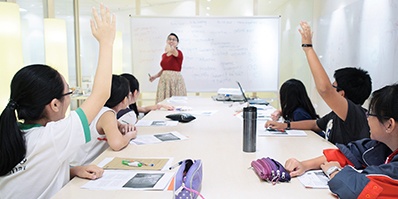Commentary On The PSLE: How Learning For Exam Excellence Goes Well Beyond Grades
From the recent national conversation on education, it is clear that the Primary School Leaving Examination (PSLE) is here to stay.
The PSLE, it is argued, still retains its purpose as a useful academic checkpoint for us to understand the academic strengths of a child and which academic programme he or she is suited for.
As experienced educators, our approach is rather counterintuitive — instead of looking at the PSLE as just an end goal, we also treat it as a vehicle through which we teach our young learners plenty about learning.
Beyond being able to excel at this national examination, we want our students to step out of the exam halls with so much more than academic improvement and excellence.
Academic Mastery That Drives Deep Learning

Whenever we teach a new skill or concept, our approach is always to teach for understanding so that deep learning takes place. That means we go above and beyond memorisation and rote learning to help students connect with what they learn so they can better understand, retain and apply knowledge.
As we help our students seek the right answers, we also want to encourage them to ask the right questions in class. When both teacher and learner arrive at the answer together, the learner appreciates and understands the skills and concepts better — there’s a sense of pride and ownership in learning, and this pays off in spades when they go on to be self-starters.
In our English and Chinese lessons, we focus on developing critical thinking skills as our students read passages before we approach the verbal and written articulation related to the task at hand. For Math and Science, we help students identify the crux of each question type, drawing from their current understanding of the topics and the concepts. We then help them to refine this understanding, as they try to meet each question with the knowledge they have.
Sure, there is a bonus that comes with deep learning — our students are equipped to deal with tough application questions in the exams. However, our strategic patience in teaching also relates to a higher goal — we want our students to understand and appreciate what they learn deeply because that will give them all the right motivations that accompany learning and testing. When they do not see the test as the end to learning, they are then empowered to always reach for next milestone.
Empowering Every Student Group To Adopt A Growth Mindset

When we first read the literature on Carol Dweck’s Growth Mindset, there was plenty that resonated with us. We work with some learners who were strong academically but who inadvertently face some setbacks when they, unexpectedly, do not perform at the exams.
We also work with a larger group of learners who face the so-called ‘poet-quant imbalance’ — some who are stronger in their language subjects and less so in Math and Science, and vice versa.
For the first group, we find that a fixed mindset prevents them from building on their strengths and learning more. We work really hard to shift their mindset so they do not plateau in their learning and academic achievement.
For the second group, we double up on our efforts to ensure they have positive experiences which change their approach towards the subjects they are weaker in. For instance, when a student who may struggle with Math manages to score two marks out of five for a difficult question, we spotlight the meaningful progress and help to uplift the student so he or she is hungry to learn more and achieve more.
Related Article: Nurture Your Child’s Love Of Learning
Related Article: The Importance Of A Positive Attitude Towards Learning
Honing Key Skills That Matter In the Exams And In Life

As a teacher, I once taught a Primary 3 student comprehension. The passage for the day was about a family who had gone to the supermarket to buy their groceries. When they travelled to the supermarket, they went on foot; but when they were returning home, they decided to take a taxi.
One of the comprehension questions was an inferential question which asked, “Why do you think the family went home by taxi?” As we were working out the answers, my student mouthed, “I think they were lazy.” Astounded, I asked him why he said that and without skipping a beat, he said, “They asked me what I thought…”
The obvious lesson in this anecdote is that every comprehension answer, even an inferential one, has to be derived from a detail in the passage. The boy and I had a good laugh about his cheeky answer but we returned quickly to the passage and I got him to take out his pencil and ruler to underline the clue, “They were heavily laden with groceries…”
As a teacher, I didn’t just want to teach my students about how to get the right answer for one comprehension question. I also wanted them to learn how to read critically and look for details that can help them make logical conclusions.
Armed with pencils and highlighters, I guided my students in ink trailing their passages and questions for what they had understood and what they had not. This is what we do at The Learning Lab — we ride on the fact that as we teach exam skills, we also take care to impart other key skills that shape the way our learners think, speak and act in life.
Final Thoughts
There is plenty of learning that happens in our classrooms that are just as important, if not more important, than the chase for the final point in the T-score, or by 2021, the next high Achievement Level band.
While it is our professional and personal responsibility to teach the techniques needed to help students excel in the exams, it is also very much part of our calling to help them learn about success criteria and to think through the factors that help them to achieve their goals.
And when the going gets tough… well, our big sibling instincts kick in — we encourage them to pick themselves up and learn from their setbacks, and teach them how to manage their stress levels. We know this will go a long way for them even beyond the PSLE.
Justin Leow is the Head of Teaching Network at The Learning Lab. Since his graduation, Justin has been an integral figure at The Learning Lab (TLL), teaching a diverse portfolio of primary and secondary English classes to prepare mainstream, GEP and IP students for the PSLE, GCE ‘O’ Levels, and GCE ‘A’ Levels respectively.
Your child's education matters to us. Let's work together to give your child the best academic guidance and key support through his or her education journey.
We're here to help. If you have questions, do call us at 6733 8711 or email us at enquiry@thelearninglab.com.sg